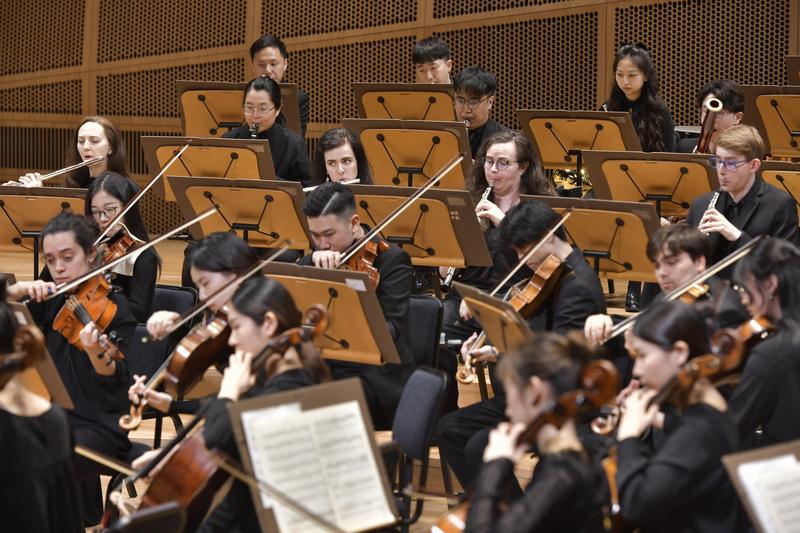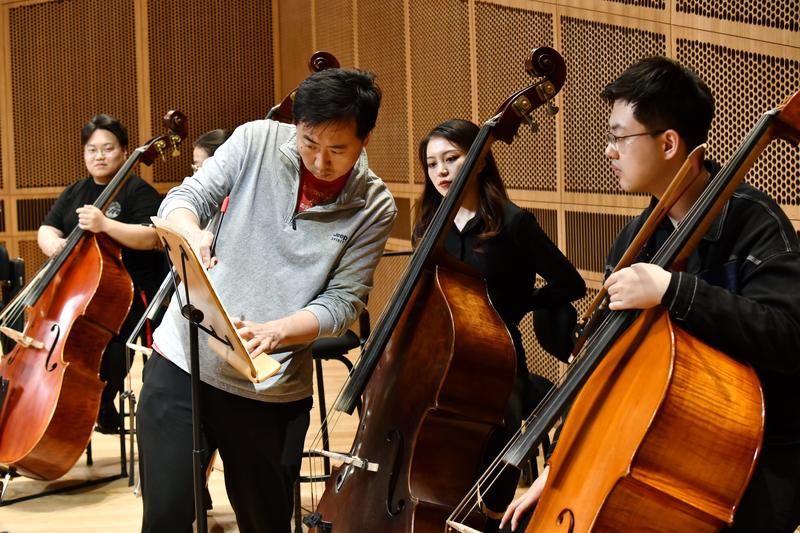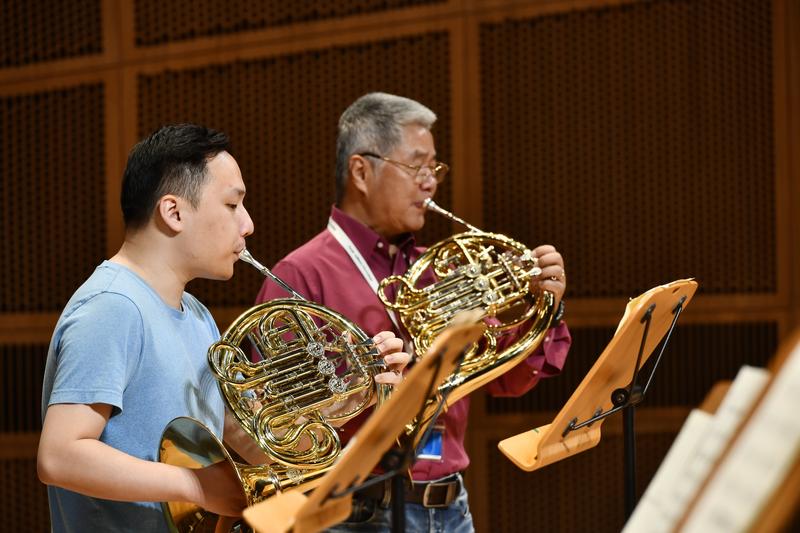China becomes destination of choice for young, foreign musicians, as symphony orchestras around the country welcome new members, many of whom were part of the first graduating class of Tianjin Juilliard School, Chen Nan reports.
 Bethany Lawrence (second from right, third row from the back) performs in a concert with Tianjin Juilliard Orchestra as its principal oboist on Dec 9, 2021. (PHOTO PROVIDED TO CHINA DAILY)
Bethany Lawrence (second from right, third row from the back) performs in a concert with Tianjin Juilliard Orchestra as its principal oboist on Dec 9, 2021. (PHOTO PROVIDED TO CHINA DAILY)
The growing interest in classical music among Chinese people successfully proves that China holds the key to the future of the genre. As more and more concert halls pop up and new symphony orchestras are established in the country, the extraordinary growth of China's classical music market is also having an impact on the global musical community.
Young musicians from around the world are looking increasingly to China when planning their careers.
South Korean violist Jeong Ji-soo is one of the new members joining the Shenzhen Symphony Orchestra, which just celebrated its 40th birthday last year.
"I always wanted to audition for a Chinese symphony orchestra. There were many more audition opportunities than I had expected and it was really tough to choose exactly which orchestras I would audition for," recalls Jeong, who started playing the violin at the age of 5 and later studied the viola during high school.
In 2020, she moved to China to join in the graduate program of the Tianjin Juilliard School, studying with violist Honggang Li of the Shanghai Quartet after graduating from the Yonsei University's College of Music.
When the Shenzhen Symphony Orchestra announced that it had viola positions available, she knew immediately that she wanted to audition for it, relishing the thought of life in the Guangdong province metropolis.
"The food in Shenzhen is a bit similar to my home in Seoul and I had prior interest in this city, so that was one of the biggest reasons I chose to audition there," says Jeong. "When I auditioned, I was as nervous as at any other audition I had taken. However, I felt so much more prepared after spending one year at the Tianjin Juilliard studying with my professors Sheila Browne and Honggang Li. When I was onstage, I felt nervous, excited, challenged, and so many other emotions all at once. I did my best and I was happy with my performance. After I learned that I had won the spot, I couldn't believe it!"
 Double bass player Zhang Daxun, resident faculty member at the Tianjin Juilliard, in a rehearsal with his student Sun Zimo. (PHOTO PROVIDED TO CHINA DAILY)
Double bass player Zhang Daxun, resident faculty member at the Tianjin Juilliard, in a rehearsal with his student Sun Zimo. (PHOTO PROVIDED TO CHINA DAILY)
Besides Jeong, Kim Min-joo, a cellist from South Korea, and three Chinese students, French horn players Xu Ruifeng, Wang Haifeng and double bass player Sun Zimo, all graduates of the Tianjin school, joined the Shenzhen Symphony Orchestra as new members. On Dec 31, when the Shenzhen Symphony Orchestra held its annual New Year concert at Shenzhen Concert Hall, Xu and Wang performed with the orchestra for the first time.
Jeong was the first student of the Tianjin school who was recruited by a Chinese symphony orchestra. She received her letter of admission in February and finished her study at the Tianjin school before starting work with the Shenzhen Symphony Orchestra.
She adds that she was so proud and immediately called her teachers and friends. "It's like a dream and I felt rewarded and happy about my growth. I'm very thankful. I feel that I have been able to develop a lot through this audition," she says.
The violist also says that moving to China has been one of the coolest adventures in her life. Everything is totally new to her. She has had many opportunities to explore the different regions of the country. "One thing I learned is that it is big, like really big, and there is no single culture that defines the entire country," says Jeong.
"During the 1980s and 1990s, many music majors from South Korea chose to study in the United States and Europe. Many of them decided to return to South Korea and became new blood for local symphony orchestras," says He Wei, CEO and artistic director of the Tianjin Juilliard School.
"Now, the rise of classical music in China is apparent to see and many international students consider China as a great opportunity to launch their careers. We hope that more students from around the world will be able to work and stay in China."
The Tianjin school, located alongside the city's Haihe River, is the first overseas campus of the New York-based Juilliard School. The Tianjin school's first graduate studies program was launched in the fall of 2020 amid the height of the COVID-19 pandemic. Last year, 33 students graduated from the Tianjin school's graduate studies program and one-third of them joined in Chinese symphony orchestras, including many international students, according to He.
 Xu Ruifeng (left) rehearses with his teacher, French horn player Chang Chou Han. (PHOTO PROVIDED TO CHINA DAILY)
Xu Ruifeng (left) rehearses with his teacher, French horn player Chang Chou Han. (PHOTO PROVIDED TO CHINA DAILY)
Oboist Bethany Lawrence, originally from Houston in the US, is one of the graduates from the Tianjin school. She says that studying in China is her very first experience living outside Texas. After graduation, she joined Shanghai Opera House Orchestra as its second principal oboist.
"I started rehearsing and performing with the group in September 2022. It's been fun so far. We perform a very diverse repertoire, including operas, opera excerpts, song cycles, and concertos from a wide range of time periods and traditions, and I am enjoying this level of diversity," says Lawrence, who started learning the oboe at age 11 when she joined a band program at school. "Shanghai is a beautiful and fascinating city. I'm happy to be here.
"One thing that became apparent when I arrived in China is the growing amount of professional opportunities here. The number of Chinese orchestras has increased by 80 in recent years, and that made me curious about possible career opportunities for myself in a place with growing public interest in classical music," she explains.
"I have always been a person who has focused more on journeys than destinations, so I am happy to see where this journey takes me."
During her time at the Tianjin school, she studied with the school's resident faculty member Scott Bell, who had worked with the Pittsburgh Symphony for a long time.
"The most important thing for me in coming to Tianjin was to stay open-minded and just roll with the punches. I knew from the interactions I had with my professor and classmates that this could be a life-changing opportunity, so long as I stayed open to change and opportunity," she recalls of her experience at the school.
"My time at the Tianjin Juilliard presented me directly with very significant career opportunities, as well as the ability to take advantage of them."
After graduating from the Tianjin Juilliard, violinist Ler Ler Ma moved to Suzhou, Jiangsu province, in October to work with the Suzhou Symphony Orchestra, a young and dynamic orchestra inaugurated in 2016. She decided to take the job in Suzhou as there are currently no openings in her native Singapore.
"We've had a few concerts in a row and a few were canceled due to the pandemic, but the concert season should be resuming now. It has been great meeting new people and working in an orchestra professionally," says Ma.
The violinist had never been to Tianjin before she studied there. She chose to study there because of the Shanghai Quartet — one of the world's foremost chamber ensembles — and the reputation of the Juilliard School.
"The biggest gain those two years (at the Tianjin school) has been the abundance of performance opportunities and the bonds between the students and the teachers. In this contained community, a sense of musical identity is cultivated," Ma says. "I sometimes send pictures or videos to my family back in Singapore and post about my life on social media. As a result, many of them have developed a positive impression of Tianjin and want to visit."
Contact the writer at chennan@chinadaily.com.cn


